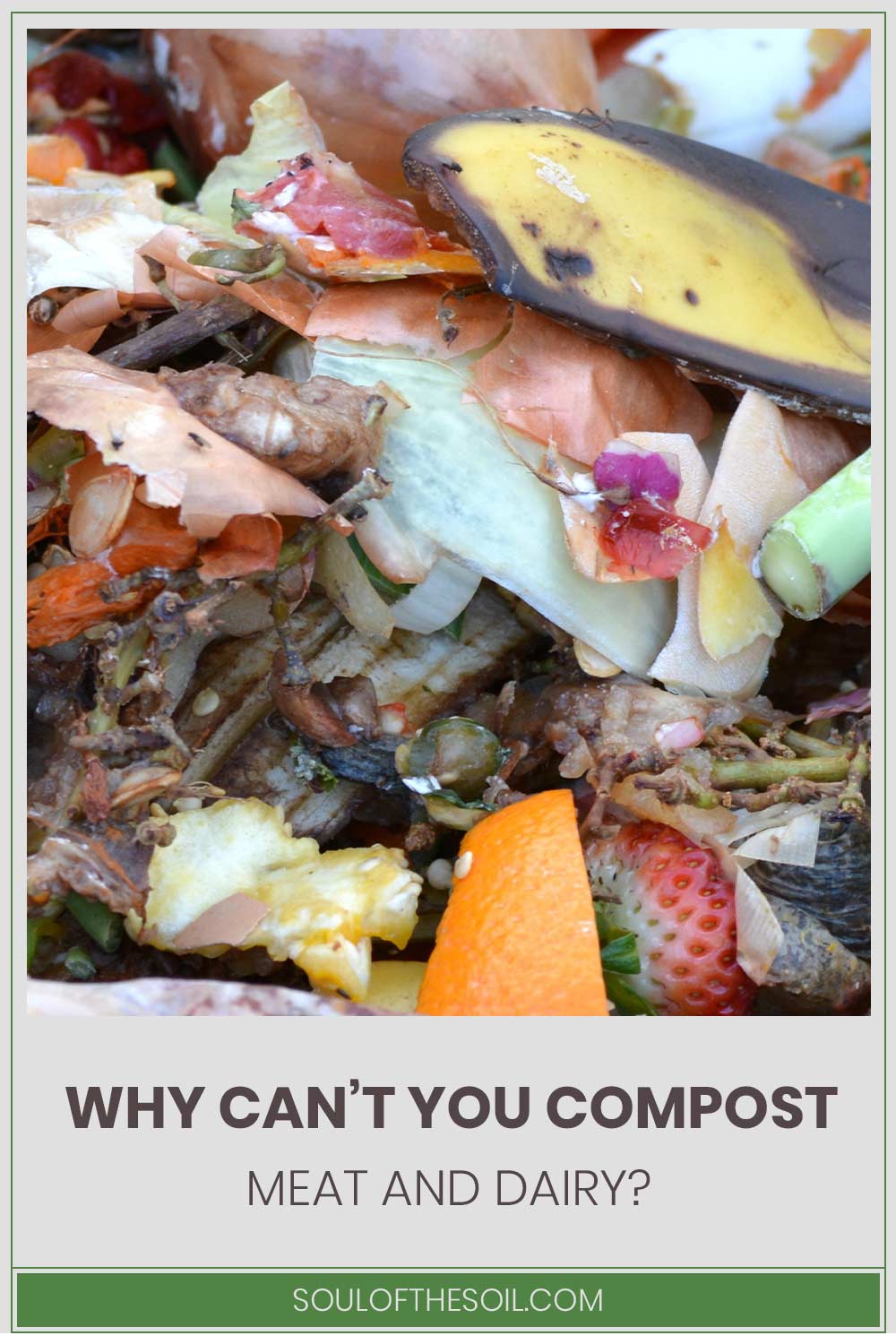Why Can’t You Compost Meat And Dairy?
We may earn commissions for purchases made through links on our site. Learn more on our about us page.
There are many reasons for meat to stay out of the composition, one being that bones do not decompose very well, and the smell of the rotting meat will attract unwanted wildlife attention.
The high nitrogen levels found in meat will also unbalance the compost chemistry, to which most homesteads with animals will give the bones to the dogs or pigs.
As for dairy, most products will have an awful natural smell that most casual composters will not be equipped to handle. Therefore, if you are looking to up your knowledge on composting, be sure to learn techniques to introduce dairy and meat into the pile effectively.

Why are Meat and Fats Not Recommended for Making Compost?
Beyond the elements mentioned earlier, meat and fats have a process of decomposing that turns their biological structure into a sticky, mushy consistency which can prevent proper airflow.
This may produce anaerobic bacteria, harming the aerobic environments and leading to an awful stench.
However, this does not mean that there are no professional tricks to introducing meat into the compost. Meat is naturally high in nitrogen, which in the right amounts, can benefit the pile and even be the catalyst from chemical decomposition processes.
Lipids create barriers between water and other materials in the compost, which can stop any chemical reactions in a pile.
What will Happen if You Put Meat in Compost?
Let us use the example of a T-bone steak, nearly completely eaten down to the bone with a few fleshy bits left over.
The first parts to go will be the proteins and muscle matter, which turns to a similar mush-like consistency that will inhibit the necessary mixing of bio-materials and chemical reactions needed for a practical compost pile.
The bone may last for years, depending on the bacterial environment of the compost, and the healthier systems will have no issue eating the T-bone from our hypothetical meal. Consider working with someone with one of these systems for the best chance of success.
Can Dairy Products Damage Compost?
As mentioned before, fats are tougher to decompose than standard composting materials. In addition, dairy products are heavy in these lipids, and when introduced to an average compost, they will produce a potent smell and attract unwanted wildlife attention.
Concerning worm compost systems, dairy foods become rancid, which will unbalance the healthy environment for the soil-turning bugs. As for the well-developed compost piles, if the dairy products are chopped up into smaller pieces, one can avoid the anaerobic conditions.
The moral of the story, be careful if you are going to introduce dairy, but it does have the ability to damage a healthy compost.
How Should You Put Dairy in Compost?
As mentioned above, there will be little tricks like cutting the dairy product into smaller, more manageable pieces to avoid any adverse side effects.
There are also other techniques that will have you mix or blend the dairy material with paper or other carbon matter to lessen the impact of the lipids from the dairy products.
Dairy should only be allowed in healthy, well-established compost environments that have been turned over and cultivated strong cultures of healthy bacteria.
Otherwise, the newer composts will need a grace period for the system to mature and the bacteria to grow cultures.
Is Meat in a Compost a Safety Risk?
There will be specific decomposition processes of meat that will create an environment that will grow dangerous bacteria. Raw meat is a metaphorical Petrie dish for bacteria like salmonella, E.coli, Clostridium perfringens, Listeria monocytogenes, and others.
Out of the molecular level and into the complex life forms realm, as mentioned earlier in the article, decomposing meats will leave a distinctive odor that will attract pests and predators to your property.
In addition, there are natural hazards to having wildlife looking for food from your compost, which then can spread to the house or other parts of the homestead.
Final Thoughts on Why can’t You Compost Meat and Dairy
There are many different opinions on the use of dairy and meat in composting, and if you have dogs or pigs, the bones might be better served as gifts to the animals.
Dairy products will need to be avoided, there are techniques to compost these items successfully, but the risk outweighs the reward.
If you have a new compost system, consider using simple carbon compound materials such as vegetables and starchy foods. These items will break down easier and help encourage the growth of healthy bacteria.



Leave a Reply
You must be logged in to post a comment.